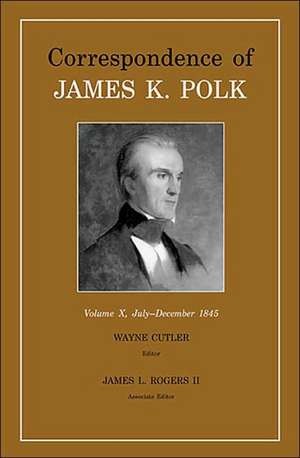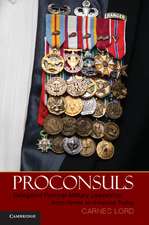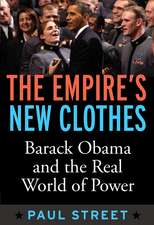Correspondence of James K. Polk, Volume 10: July-December 1845: Utp Correspondence James Polk, cartea 10
Autor James K. Polk Contribuţii de James L. Rogers Ii, Wayne Cutleren Limba Engleză Hardback – 30 apr 2004
In the second half of 1845 the focus of Polk’s correspondence shifted from those issues relating to the formation of his administration and distribution of part patronage to those that would give shape and consequence to his presidency: the admission of Texas, preparation for its defense, restoration of diplomatic relations with Mexico, and termination of joint occupancy of the Oregon Country. For the most part the incoming letters tended to urge rather more militancy on the Texas and Oregon questions than Polk would adopt, and notions of national destiny registered a singular theme of buoyant confidence in taking on both Mexico and Great Britain if military action should be required. President Polk and Secretary of State James Buchanan succeeded in both using and controlling the surge of nationalism that heightened expectations for expansion westward.
Polk and Buchanan agreed on the importance of reestablishing diplomatic relations with Mexico, but the President chose to take a personal hand in managing the selection and instruction of John Slidell, whose departure for Vera Cruz would not be made public until he had arrived in Mexico. Polk wanted to give the fledgling Mexican administration of Jose` Joaqui`n Herrera a chance to compose Mexico’s differences with Washington free of contrary pressures from Great Britain and France; and he fully understood the price that Herrara might pay for a peaceful settlement of the Texas question. If Mexico required more than $6 million for the purchase of their two most northern provinces, as provided in his instructions, Slidell might agree to any reasonable additional sum.
Slidell’s mission probably never had much chance of success, for without control of his military the Herrara administration could neither give up its claim to Texas nor overcome British opposition to the sale of New Mexico and Upper California. Within but a few days of Slidell’s arrival in the Mexican capital, Mariano Paredes y Argilla organized a military coup, put the Herrera government to flight, and on January 2, 1846, declared himself interim of president of Mexico.
Polk left on the table his predecessor’s initiative to divide the Oregon Country at the 49th parallel with all of Vancouver Island going to the British. The summary rejection of that offer by the British minister to Washington, Richard Packenham, so angered Polk that on August 30th he formally withdrew all prior offers to settle the dispute. The British foreign secretary, Lord Aberdeen, disavowed and assured the U.S. minister to Britain, Louis McLane, that no ultimatum had been sanctioned by his government. Buchanan tried in vain to soften Polk’s decision to initiate further negotiations, but he had determined to give the required one year advance notice prior to abrogating the treaty of joint occupancy. Accordingly, in his First Annual Message to Congress Polk asked for a joint resolution terminating Oregon agreements with Great Britain. Polk received high praise for his Message and its hard line on Texas and Oregon.
In addition to the texts, briefs, and annotations, the editors have calendared all of the documents for the last six months of 1845. Entries for unpublished letters include documents’ dates, addresses, classifications, repositories, and pre`cis.
The Polk Project is sponsored by the University of Tennessee and assisted by grants from the National Historical Publications and Records Commission, the Nations Endowment for the Humantines, and the Tennessee Historical Commission.
The Authors:
Wayne Cutler is research professor of history at the University of Tennessee. He earned his bachelor’s degree at Lamar University and his master’s and doctor’s degrees and University of Texas at Austin. Professor Cutler became director of the Polk Project in 1975, served as associate editor in the fourth volume of the correspondence, and headed the editorial team in the preparation of the series’ fifth and subsequent volumes. He began his professional career in 1966 as an editorial associate of the Southwestern Historic Quarterly and moved to the assistant editorship of the Henry Clay Project in 1970.
James L. Rogers II, the Project’s associate editor from 1995 until 2002, received both his bachelor’s and master’s degrees from the University of Louisiana at Monroe and his doctor’s degree from the University of Tennessee. He joined the Polk staff in 1991 as graduate research assistant and became associate editor following completion of the series’ ninth volume.
Polk and Buchanan agreed on the importance of reestablishing diplomatic relations with Mexico, but the President chose to take a personal hand in managing the selection and instruction of John Slidell, whose departure for Vera Cruz would not be made public until he had arrived in Mexico. Polk wanted to give the fledgling Mexican administration of Jose` Joaqui`n Herrera a chance to compose Mexico’s differences with Washington free of contrary pressures from Great Britain and France; and he fully understood the price that Herrara might pay for a peaceful settlement of the Texas question. If Mexico required more than $6 million for the purchase of their two most northern provinces, as provided in his instructions, Slidell might agree to any reasonable additional sum.
Slidell’s mission probably never had much chance of success, for without control of his military the Herrara administration could neither give up its claim to Texas nor overcome British opposition to the sale of New Mexico and Upper California. Within but a few days of Slidell’s arrival in the Mexican capital, Mariano Paredes y Argilla organized a military coup, put the Herrera government to flight, and on January 2, 1846, declared himself interim of president of Mexico.
Polk left on the table his predecessor’s initiative to divide the Oregon Country at the 49th parallel with all of Vancouver Island going to the British. The summary rejection of that offer by the British minister to Washington, Richard Packenham, so angered Polk that on August 30th he formally withdrew all prior offers to settle the dispute. The British foreign secretary, Lord Aberdeen, disavowed and assured the U.S. minister to Britain, Louis McLane, that no ultimatum had been sanctioned by his government. Buchanan tried in vain to soften Polk’s decision to initiate further negotiations, but he had determined to give the required one year advance notice prior to abrogating the treaty of joint occupancy. Accordingly, in his First Annual Message to Congress Polk asked for a joint resolution terminating Oregon agreements with Great Britain. Polk received high praise for his Message and its hard line on Texas and Oregon.
In addition to the texts, briefs, and annotations, the editors have calendared all of the documents for the last six months of 1845. Entries for unpublished letters include documents’ dates, addresses, classifications, repositories, and pre`cis.
The Polk Project is sponsored by the University of Tennessee and assisted by grants from the National Historical Publications and Records Commission, the Nations Endowment for the Humantines, and the Tennessee Historical Commission.
The Authors:
Wayne Cutler is research professor of history at the University of Tennessee. He earned his bachelor’s degree at Lamar University and his master’s and doctor’s degrees and University of Texas at Austin. Professor Cutler became director of the Polk Project in 1975, served as associate editor in the fourth volume of the correspondence, and headed the editorial team in the preparation of the series’ fifth and subsequent volumes. He began his professional career in 1966 as an editorial associate of the Southwestern Historic Quarterly and moved to the assistant editorship of the Henry Clay Project in 1970.
James L. Rogers II, the Project’s associate editor from 1995 until 2002, received both his bachelor’s and master’s degrees from the University of Louisiana at Monroe and his doctor’s degree from the University of Tennessee. He joined the Polk staff in 1991 as graduate research assistant and became associate editor following completion of the series’ ninth volume.
Preț: 555.01 lei
Preț vechi: 652.95 lei
-15% Nou
Puncte Express: 833
Preț estimativ în valută:
106.20€ • 110.88$ • 87.89£
106.20€ • 110.88$ • 87.89£
Carte disponibilă
Livrare economică 14-28 martie
Preluare comenzi: 021 569.72.76
Specificații
ISBN-13: 9781572333048
ISBN-10: 1572333049
Pagini: 654
Dimensiuni: 152 x 229 x 46 mm
Greutate: 1.18 kg
Ediția:First Edition, First Edition
Editura: University of Tennessee Press
Colecția Univ Tennessee Press
Seria Utp Correspondence James Polk
ISBN-10: 1572333049
Pagini: 654
Dimensiuni: 152 x 229 x 46 mm
Greutate: 1.18 kg
Ediția:First Edition, First Edition
Editura: University of Tennessee Press
Colecția Univ Tennessee Press
Seria Utp Correspondence James Polk
Notă biografică
Wayne Cutler is research professor of history at the University of Tennessee. He earned his bachelor’s degree at Lamar University and his master’s and doctor’s degrees and University of Texas at Austin. Professor Cutler became director of the Polk Project in 1975, served as associate editor in the fourth volume of the correspondence, and headed the editorial team in the preparation of the series’ fifth and subsequent volumes. He began his professional career in 1966 as an editorial associate of the Southwestern Historic Quarterly and moved to the assistant editorship of the Henry Clay Project in 1970.
James L. Rogers II, the Project’s associate editor from 1995 until 2002, received both his bachelor’s and master’s degrees from the University of Louisiana at Monroe and his doctor’s degree from the University of Tennessee. He joined the Polk staff in 1991 as graduate research assistant and became associate editor following completion of the series’ ninth volume.
James L. Rogers II, the Project’s associate editor from 1995 until 2002, received both his bachelor’s and master’s degrees from the University of Louisiana at Monroe and his doctor’s degree from the University of Tennessee. He joined the Polk staff in 1991 as graduate research assistant and became associate editor following completion of the series’ ninth volume.

















